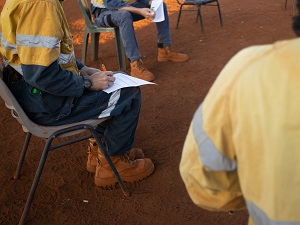This article is the answer to a question we received from one of our awesome Weeklysafety.com members. We thought it was a great question and we wanted to share our recommendations.
Question: Are there annual mandatory safety training topics that must be conducted in order to be compliant with OSHA?
Short answer: Yes, but it depends on the tasks the workers perform, the specific hazards they may encounter during a work day and ultimately the specific regulations those task and hazards would fall under based on the work and the industry. So, the easy answer is… every company is different and the answer isn’t exactly straightforward.

But let us try to provide a bit more clarity to this question…
Training Requirements in OSHA Standards
From a federal OSHA stand point you could take a look at this document, this document is great: OSHA 2254 Training Requirements in OSHA Standards. This OSHA resource provides a great summary of OSHA training requirements.
Tip: If you do a search (CTRL-F) on the word annual in the document you’ll see that you can find all the specific standards that refer to an annual refresher training. As you scroll through each section, and review the standards on annual training requirements, then evaluate the requirement against the tasks and hazards that apply to your workforce. Incorporate the required training into your annual safety training program.
Construction Training Requirements
Below are a few examples from this document that apply to Construction:
- 1926.60 Methylenedianiline (l) Communication of hazards to employees (3) Information and training. (i) The employer shall provide employees with information and training on MDA, in accordance with 29 CFR 1910.1200(h), at the time of initial assignment and at least annually thereafter.
- 1926.62 Lead in Construction (l) Communication of hazards (iv) The employer shall also provide the training program at least annually for each employee who is subject to lead exposure at or above the action level on any day.
- 1910.134 Respiratory protection (k) Training and information. This paragraph requires the employer to provide effective training to employees who are required to use respirators. The training must be comprehensive, understandable, and recur annually, and more often if necessary.

The examples above are applicable to construction work but a lot of contractors often fail to recognize that they may fall under General Industry regulations depending on the specific work they are performing. There could be situations where they are performing warranty or service work and may be subject to OSHA standards for lockout/tagout under 29 CFR 1910.147 or other standards that have an annual training requirement.
General Industry Training Requirements
Other General Industry Standards that require annual training include:
- 1910.95 Occupational Noise Exposure (k)(2) The training program shall be repeated annually for each employee included in the hearing conservation program.
- 1910.120 Hazardous Waste Operations (p)(7)(ii) Current employees shall receive eight hours of refresher training annually.
- 1010.157 Portable Fire Extinguishers (g)(1) Where the employer has provided portable fire extinguishers for employee use in the workplace, the employer shall also provide an educational program to familiarize employees with the general principles of fire extinguisher use and the hazards involved with incipient stage firefighting. (2) The employer shall provide the education required in paragraph (g)(1) of this section upon initial employment and at least annually thereafter.

Another specific standard that should be considered, although it doesn’t state “annual” is listed below because it is often cited by OSHA compliance officers whenever there isn’t a specific training requirement.
- 1926.21(b)(2) The employer shall instruct each employee in the recognition and avoidance of unsafe conditions and the regulations applicable to his work environment to control or eliminate any hazards or other exposure to illness or injury.
OSHA Training Reminders
Lastly, even if there isn’t a specific statement in the OSHA regulation that say the employer must provide annual training (or retraining) it is typically seen as an industry best practice to do annual refresher training on many, if not all safety training.
Consistent safety training will always pay back over and over again as employees’ experience fewer injuries and illnesses, demonstrate better morale, and the company realizes lower insurance premiums.
Disclaimer: This article does not provide a complete list of required safety training required for your company and while this article was written by a safety professional, Weeklysafety.com does not provide safety consulting.
Remember! Keep a record of all safety and health training. If there is ever an incident, one of the first questions any investigator will ask is, “Did the employee receive adequate training to do their job?”

Holding regular safety meetings, toolbox talks or safety moments with your crews, teams and staff is a great way to ensure that your company is off to a great start meeting and exceeding all of OSHA’s compliance standards.
.jpg)

.jpg)